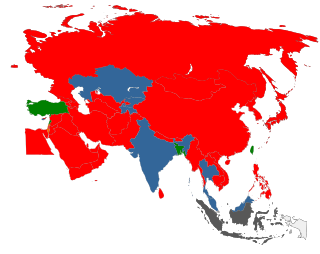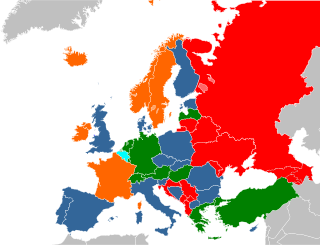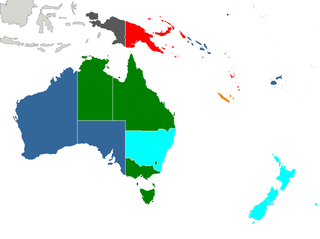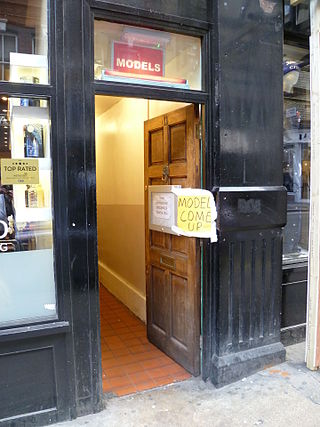Related Research Articles
Child sex tourism (CST) is tourism for the purpose of engaging in the prostitution of children, which is commercially facilitated child sexual abuse. The definition of child in the United Nations Convention on the Rights of the Child is "every human being below the age of 18 years". Child sex tourism results in both mental and physical consequences for the exploited children, which may include sexually transmitted infections, "drug addiction, pregnancy, malnutrition, social ostracism, and death", according to the State Department of the United States. Child sex tourism, part of the multibillion-dollar global sex tourism industry, is a form of child prostitution within the wider issue of commercial sexual exploitation of children. Child sex tourism victimizes approximately 2 million children around the world. The children who perform as prostitutes in the child sex tourism trade often have been lured or abducted into sexual slavery.

Street prostitution is a form of prostitution in which a prostitute solicits customers from a public place, most commonly a street, while waiting at street corners or walking alongside a street, but also other public places such as parks, benches, etc. The street prostitute is often dressed in a provocative manner. The sex act may be performed in the customer's car, in a nearby secluded street location, or at the prostitute's residence or in a rented motel room.

In Great Britain, the act of engaging in sex as part of an exchange of various sexual services for money is legal, but a number of related activities, including soliciting in a public place, kerb crawling, owning or managing a brothel, pimping and pandering, are illegal. In Northern Ireland, which previously had similar laws, paying for sex became illegal from 1 June 2015.

The legality of prostitution in Asia varies by country. There is often a significant difference in Asia between prostitution laws and the practice of prostitution. In 2011, the Asian Commission on AIDS estimated there were 10 million sex workers in Asia and 75 million male customers.
Prostitution in Finland is legal, but soliciting in a public place and organised prostitution are illegal. According to a 2010 TAMPEP study, 69% of prostitutes working in Finland are migrants. As of 2009, there was little "visible" prostitution in Finland as it was mostly limited to private residences and nightclubs in larger metropolitan areas.

Prostitution in Australia is governed by state and territory laws, which vary considerably, although none ban the selling of sex itself.
"Common prostitute" is a term used in English law related to prostitution. The term was first used in the Vagrancy Act 1824. The term continued to be used in the Street Offences Act 1959 which maintained the illegality of street prostitution. Section 1 stated: "It shall be an offence for a common prostitute to loiter or solicit in a street or public place for the purpose of prostitution."
Current laws passed by the Parliament of Canada in 2014 make it illegal to purchase or advertise sexual services and illegal to live on the material benefits from sex work. The law officially enacted criminal penalties for "Purchasing sexual services and communicating in any place for that purpose."
Prostitution is not illegal in Sri Lanka, however, related activities such as soliciting, procuring, and brothels are outlawed. It is also illegal to traffic persons for prostitution, especially minors. Prostitution is not as widespread in Sri Lanka as in some neighbouring countries. It is estimated that there are 40,000 prostitutes in the country, and nearly half of them operate in Colombo.

The legality of prostitution in Europe varies by country.

The Vagrancy Act 1824 is an Act of Parliament of the United Kingdom that makes it an offence to sleep rough or beg in England and Wales. The legislation was passed in Georgian England to combat the increasing number of people forced to live on the streets due to the conclusion of the Napoleonic Wars and the social effects of the Industrial Revolution. Critics of the law included politician and abolitionist, William Wilberforce, who condemned the Act for making it a catch-all offence for vagrancy with no consideration of the circumstances as to why an individual might be homeless.

The Sexual Offences Act 1985 (c.44) was an Act of the Parliament of the United Kingdom that created two offences concerning prostitution, and increased the maximum sentence for attempted rape from seven years to life imprisonment. The act was applicable in England and Wales only.
Prostitution in Scotland has been similar to that in England under the State of Union, but since devolution, the new Scottish Parliament has pursued its own policies.
Prostitution in Northern Ireland is governed by the Human Trafficking and Exploitation Act 2015, which makes it illegal to pay for sex in Northern Ireland. Prior to the act coming into effect, prostitution in Northern Ireland was regulated by the same or similar laws to those in England and Wales, as it is elsewhere in the United Kingdom. At that time, prostitution in Northern Ireland was legal subject to a number of restraints which controlled certain activities associated with prostitution, such as soliciting, procuring, living on the proceeds of prostitution (pimping), exploitation of prostitutes, under-age prostitution, and keeping a brothel. However, devolution provided the opportunity for separate legislation in Northern Ireland.
Prostitution in Namibia is legal and a highly prevalent common practice. Related activities such as solicitation, procuring and being involved in the running of a brothel are illegal. A World Bank study estimated there were about 11,000 prostitutes in Namibia.

Prostitution in Oceania varies greatly across the region. In American Samoa, for instance, prostitution is illegal, whereas in New Zealand most aspects of the trade are decriminalised.

A Soho walk-up is a flat in Soho, London, United Kingdom, that is used by a female sex worker for the purposes of prostitution. The flats are located on the upper floors of buildings in Soho's red light district, often above shops, and accessed by a staircase from a door on the street. They form a distinctive way of working that is characteristic of the sex industry in Soho, originating in the 1960s and declining during the 21st century.
Prostitution in Fiji is legal, but most activities connected with it are illegal: brothel keeping, pimping and buying or selling sex in public. Street workers make up the bulk of Fiji's prostitutes. Many of the prostitutes are Asian, especially Chinese that provide sexual services for the growing number of tourists arriving in the country and also locals. Some come into the country on student visas. In 2014, it was estimated that there were 857 sex workers in Fiji. Even though buying and selling sex in public is illegal in Fiji, police have no legal authority to arrest prostitutes without an official report being lodged for the police to take action.
Crown dependencies are independently administered jurisdictions which do not form part of either the United Kingdom or the British Overseas Territories. They are self-governing possessions of the Crown. Internationally, the dependencies are considered "territories for which the United Kingdom is responsible", rather than sovereign states.
Clients of prostitutes or sex workers are sometimes known as johns or tricks in North America and punters in Britain and Ireland. In common parlance among sex workers as well as with others, the act of negotiating and then engaging with a client is referred to as turning a trick.
References
- ↑ Hill, Amelia (15 December 2002). "The policewomen who pose as prostitutes to trap kerb crawlers". The Guardian. Retrieved 29 November 2018.
- ↑ "Prostitution laws around the world". Global News. 20 December 2013. Retrieved 29 November 2018.
- 1 2 "Prostitution and Exploitation of Prostitution". www.cps.gov.uk. Crown Prosecution Service. 5 July 2018. Retrieved 29 November 2018.
- ↑ "US Federal and State Prostitution Laws and Related Punishments". prostitution.procon.org. ProCon.org. Retrieved 29 November 2018.
- ↑ Cook, Ian. "Research Projects". Imagining Urban Futures. Archived from the original on 25 September 2019. Retrieved 29 November 2018.
- ↑ "Prostitution in India and it's [sic] legal analysis". Lawyers Club India. Retrieved 29 November 2018.
- ↑ "Prostitution Law Reform in New Zealand - New Zealand Parliament". www.parliament.nz. Retrieved 2023-04-05.
- ↑ "Sexual Offences Act 1985" (PDF). legislation.gov.uk. Retrieved 29 November 2018.
Section 1
- ↑ Hubbard, Phil; Scoular, Jane (2010). "Making the vulnerable more vulnerable? The contradictions of British street prostitution policy". In Canter, D; Ioannou, M; Youngs, D (eds.). Safer Sex in the City: The Experience and Management of Street Prostitution. Ashgate. pp. 135–153. doi:10.1177/1057567710373119. ISBN 978-0754626152. S2CID 144214060.
- ↑ "Policing and Crime Act 2009". www.legislation.gov.uk. Retrieved 29 November 2018.
Section 19
- ↑ "Sexual Offences Act 2003". www.legislation.gov.uk. Retrieved 29 November 2018.
Section 51A
- 1 2 "Prostitution and Exploitation of Prostitution | The Crown Prosecution Service". www.cps.gov.uk. Retrieved 2023-04-05.
- ↑ Campbell, Rosie; Storr, Merl (March 2001). "Challenging the Kerb Crawler Rehabilitation Programme". Feminist Review. 67 (1): 94–108. doi:10.1080/01417780122701. S2CID 143593103.